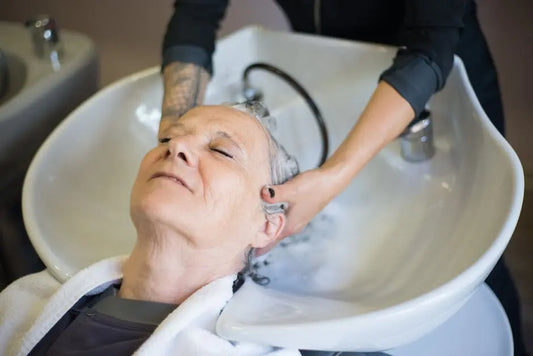Dry scalp is a common concern, especially among residents of Dallas, where the varying climate can exacerbate the condition. In this blog, we’ll delve into what causes dry scalp, how it affects hair health, and practical solutions to keep your scalp and hair in vibrant condition.
What Causes Dry Scalp?
Dry scalp can result from a multitude of causes. One prominent factor is environmental conditions, which play a significant role, especially in places like Dallas. The city experiences a range of humidity levels throughout the year, contributing to both dry air in the colder months and dehydration in the hotter months. This fluctuation can lead to the scalp losing its natural moisture, causing it to become dry and flaky. Additionally, the hard water prevalent in the region can strip the scalp of essential oils required for moisture retention. Hard water contains high levels of minerals like calcium and magnesium, which bind with natural oils and wash them away, leaving the scalp dry and susceptible to irritation. Dallas residents, therefore, face these unique challenges that make maintaining scalp health particularly tricky.
Aside from environmental factors, lifestyle choices can exacerbate dry scalp conditions. The frequent use of styling products, which often contain drying alcohols, can worsen dryness by stripping the scalp of its oils. Regularly applying heat from hairdryers or straighteners can also compromise the scalp’s hydration. Over-washing is another common issue, as it can rob the scalp of the sebum it naturally produces to protect and moisturize. To combat these effects, selecting scalp care products tailored to your specific needs is crucial, as these can mitigate the harmful impact of harsh ingredients.
Interestingly, health-related factors can be culprits too. For instance, diet plays a key role in maintaining both scalp and hair health. A lack of nutrients such as zinc and vitamin B can contribute to the dehydration of the scalp. Moreover, stress, an often underestimated factor, can trigger conditions like seborrheic dermatitis, leading to issues like redness and flaky patches. It’s essential to consider these internal factors when creating a holistic approach to scalp care.
The Impact of Dry Scalp on Hair Health
A dry scalp can significantly affect hair health in more ways than one. When the scalp is deprived of moisture, it struggles to maintain a balanced environment for hair growth. The dry conditions may cause hair follicles to become weakened and even damaged, which can manifest as increased hair breakage and a lack of vibrancy. Traditionally, a healthy scalp generates sufficient oils to protect the hair, giving it that glossy, resilient appearance. Without these oils, hair becomes dull and brittle, more prone to split ends and breakage.
Moreover, the itchiness associated with dry scalp often leads to excessive scratching. While this might bring temporary relief, it can introduce additional problems. Scratching can harm the scalp tissue, cause inflammation, and even lead to hair loss by affecting the hair follicles’ capacity to hold onto strands firmly. It’s a known fact that the scalp’s condition directly influences hair growth cycles; hence, issues like severe dandruff can interrupt these cycles, resulting in thinning hair or stunted growth.
Persistent dry scalp conditions can also diminish the overall hair experience. The constant irritation can be distracting and uncomfortable, potentially lowering confidence levels and affecting daily life. For individuals already dealing with hair conditions like androgenic alopecia, commonly known as pattern baldness, dry scalp can exacerbate the situation, leading to faster hair thinning. Addressing the dry scalp becomes not just a cosmetic concern but a necessary step towards comprehensive head and hair health.
Unique Challenges of Dealing with Dry Scalp in Dallas
Dallas is famous for its diverse climate, which presents unique challenges for those looking to maintain scalp health. In summer, high temperatures can desiccate the skin, leading to increased sebum production as the body tries to compensate—often resulting in an oily surface masking an underlying dry scalp. Conversely, during winter, low humidity can pull moisture from the scalp, compounding the difficulty of maintaining hydration levels. These extremes make it imperative to adapt your scalp care regimen accordingly throughout the seasons.
Another significant factor is the hard water that prevails in Dallas. Hard water contains minerals that can build up on the scalp and hair, impeding proper hydration. This mineral build-up may also lead to scalp irritation, paving the way for dryness and consequent issues like dandruff. Additionally, exposure to pollutants and allergens is especially heightened in urban areas, and these can settle on the scalp, leading to reactions or buildup that interfere with scalp health.
Practical Solutions to Combat Dry Scalp
To tackle dry scalp effectively, it’s advisable to incorporate a few essential practices into your daily routine. One proactive measure is the use of a humidifier at home, especially in the dryer colder months, to maintain an ambient moisture level, thereby preventing scalp dehydration. Staying hydrated by drinking ample water daily supports overall skin health, including the scalp. Adopting a diet rich in omega-3 fatty acids, iron, and vitamins A and E can strengthen the scalp from within, providing the nutrients needed for a healthy, balanced scalp.
Choosing the right hair care products is crucial in combating dry scalp. Opt for sulfate-free shampoos and conditioners as they are gentler and less likely to strip the scalp of its natural oils. Incorporating products with moisturizing ingredients like coconut oil, aloe vera, or argan oil can provide the needed hydration. Additionally, using a scalp exfoliant once a week can help remove product buildup, allowing the scalp to breathe and absorb moisture better.
Implementing gentle scalp massages can stimulate blood circulation, promoting better delivery of nutrients and oxygen to hair follicles. This not only aids in maintaining scalp health but also enhances hair growth. Regular massages with nourishing oils such as tea tree or lavender can further soothe irritation and diminish flakiness.
For persistent dry scalp conditions, incorporating targeted treatments can prove beneficial. Products enriched with acids like salicylic acid help in exfoliating dead skin layers, equipping the scalp to better absorb moisture. It’s essential to follow these solutions regularly to see improvement—consistency matters significantly in combating dry scalp effectively and sustainably.
When to Seek Professional Help
While many individuals find relief with over-the-counter remedies and changes to their hair care routines, there are times when professional guidance is beneficial. If after several weeks of dedicated self-care you continue to experience severe dryness, persistent itching, or soreness, visiting a dermatologist is recommended. A dermatologist can perform a thorough examination and diagnose any underlying conditions that might be contributing to the dryness. Such conditions could include psoriasis or seborrheic dermatitis, which may require prescription treatments for relief.
A healthcare professional might also recommend specialized treatments such as light therapy or medicated topical solutions, which can provide targeted relief to stubborn scalp issues. Additionally, for those experiencing related hair loss, clinics like New Image Hair Clinic offer personalized solutions such as laser hair therapy, which can stimulate improved circulation and support healthier hair growth.
Nurturing Healthy Hair in Dallas
Addressing dry scalp not only improves your scalp’s condition but also enhances the overall health and appearance of your hair. By understanding the unique factors in Dallas that contribute to dry scalp, and taking proactive care, you can enjoy healthier, more robust hair.





